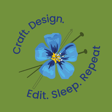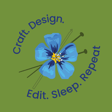Become a Creator today!Start creating today - Share your story with the world!
Start for free
00:00:00
00:00:01

Episode 36: Imposter Syndrome
We all feel it sometimes, or at least I do. I look at my own feelings of imposter syndrome and talk about how I handle it.
Transcript
Podcast Introduction
00:00:14
Speaker
Welcome to Craft, Design, Edit, Sleep, Repeat with hosts Lisa Conway and Nikki Jensen. Listen as we take a deep dive into the business of fibercraft design.
00:00:39
Speaker
Well, hello everybody.
Imposter Syndrome Overview
00:00:41
Speaker
Today's episode is going to be short and it's going to be sweet, but I think it will cover a topic that we all should at least stop and think about. And it won't be an interview, but I have a very special interview coming the first week of September. So please stay tuned.
00:01:08
Speaker
So what would I like to talk about today? Well, today I'd like to talk about imposter syndrome. I've been feeling a little bit of this myself recently. I made a mistake. I missed something on a pattern. And thankfully, the designer mentioned it to me. She told me about it and gave me an opportunity to make good on it.
00:01:35
Speaker
But it was still a little embarrassing that she found something after I had sent it back to her. And I had to remind myself that just because I made a mistake doesn't make me a failure and it doesn't make me not good at my job. We're all human. We all miss things.
00:01:59
Speaker
this particular pattern had had a number of issues and I missed that one. It was, it's just the way it was.
Personal Experiences with Imposter Syndrome
00:02:11
Speaker
So it made me feel like I needed to address this because I think as designers, especially as new designers, it's really easy to fall into the trap of what we call imposter syndrome.
00:02:29
Speaker
Imposter syndrome actually has a clinical definition, but for our purposes today, it's the feeling of inadequacy and self-doubt of insecurity that can prevent us from reaching for and achieving our goals. It's very common.
00:02:56
Speaker
Even big name designers I've seen express it, maybe not quite with those words, but nonetheless, they have made comments on their podcasts, on their video podcasts and such that lead me to believe that they don't always feel like they're a big name, even though they are, or even though we think they are.
00:03:27
Speaker
It's a very common feeling, especially among high achievers. And as designers, as creatives, we have a tendency to be high achievers. It can affect people of any age, any gender, any background. It can occur in almost any situation from social to
00:03:53
Speaker
job. In this case, we're talking about our designer jobs.
Characteristics and Coping Mechanisms
00:03:59
Speaker
And it can be dangerous if it goes too far. It can cause sleep disturbances, depression, anxiety, anxiety, sorry, my mouth is not working well, anxiety, distress, insecurity,
00:04:23
Speaker
and poor work satisfaction and performance. You can become so afraid that you're not good enough that it can become a self fulfilling prophecy. So it's important that we look at what are the common characteristics of imposter syndrome. We figure out what characteristics we're exhibiting and figure out ways to cope with them.
00:04:56
Speaker
Some common characteristics include self-doubt, sabotaging your own success. I'm kind of guilty of that when I think I designed a pattern. I had it written up. I had it tech edited. I had the photos for it. I
00:05:22
Speaker
just didn't finalize it. I didn't put all the photos in and I didn't get it uploaded to Ravelry and in my store. And in this examination of imposter syndrome, I'm realizing that I kind of felt like maybe it wasn't good enough. It is a hat pattern and there's hundreds of thousands of hat patterns out there.
00:05:49
Speaker
But it's a beautiful pattern and I've been told by people who tested it that it was a really fun knit. So I need to get it finished up. And to that end, I've actually been working on it this week and it should be out this fall. I don't anticipate launching it until probably the end of October, early November, but it's a quick knit and it'll be great for holiday knitting.
Dealing with Self-Doubt and Failure
00:06:19
Speaker
There is a matching cowl in a lighter weight yarn that you can choose to do that I've also got to get finished up and they will probably launch together. So how long have those sat there? Almost a year. I actually probably started knitting the original sample
00:06:46
Speaker
the end of July, maybe early August. I know I got the yarn for it in July. And it wasn't long after that that I started doing the knitting. So it should have been ready to launch last October. And I just let it go. I sabotaged my own success.
00:07:12
Speaker
Another thing can be undervaluing your contributions. That happens a little here on the podcast because sometimes I feel like maybe I'm talking about things I don't know enough about. Imposter syndrome being one of them.
00:07:32
Speaker
but I've done some reading and I've done some examining of my own situation and I felt it was important to at least touch on it. Even if I can't share with you expert advice, I can only share what I've found and I can only share what I'm doing myself.
00:07:58
Speaker
So undervaluing my contributions definitely plays a role. Low self-esteem. I don't know that that one's as big of a characteristic for me. It maybe plays a role in
00:08:16
Speaker
the designing aspect especially. I've never considered myself horribly creative. I've never seen myself as an artist. I've never been able to live up to my sister's abilities. One is a phenomenal artist in form of painting and drawing and that sort of thing. And the other is an amazing psoas that
00:08:47
Speaker
She just astounds me every time because she can visualize something and make it happen in a way that I've never been able to do.
00:09:00
Speaker
So maybe there is a little low self-esteem if I'm comparing myself to them, but on a day-to-day basis, that doesn't happen. Fear of failure. Yeah, that's a biggie. Overworking. I don't know. I would say rather than overworking, I might say overthinking the work.
00:09:27
Speaker
Not accepting recognition for achievements. If you find yourself turning down awards or gratitude or compliments and obviously comparing myself to others or comparing yourself to others leads to the feeling of imposter syndrome.
00:09:56
Speaker
So when does this become something that's big enough that it really needs more than just your own work?
Seeking Help and Collaboration
00:10:13
Speaker
When do you need to maybe seek help go to a counselor? And I would say at the point where it's truly interrupting your life.
00:10:25
Speaker
If imposter syndrome, that feeling of inadequacy is so big that you refuse to try, if it's impacting your work performance in any way, if it's impacting your social life in any way, it's time to find someone to help. And it's time to examine what you're doing and why you're doing it.
00:10:57
Speaker
Are you a perfectionist? Are you expecting it to be flawless before you put it out into the world? As I said, I'm not perfect. I made a mistake. I missed something. If I were to make sure that I hadn't missed anything, I'd never get the work done.
00:11:26
Speaker
And I get concerned when I am digging so deep that it's taking me hours and hours and hours to get the job done. But I need to find ways, I need to
00:11:47
Speaker
find have make sure I use my checklist right have a checklist and use your checklist that's kind of a big key there don't expect everything you do to turn out perfect but if you're micromanaging everything if you have
00:12:14
Speaker
If you can't figure out ways to delegate some things, if you obsess over every little detail, maybe talking to someone else will help. If you only expect it to be perfect when it walks out the door,
00:12:38
Speaker
Maybe you can do it yourself. I'm hoping that my imposter syndrome is something I'm managing on my own and I'm keeping tabs on it. And I'm thinking about how I'm thinking about the work I'm doing. That was a very convoluted phrase. And I'm realizing it's never going to be perfect.
00:13:06
Speaker
And I mean that sincerely. It's never going to be perfect. I'm going to miss things. I'm going to have to apologize when I miss things. I'm going to have to redo the edit on a pattern for free because I missed things. That happens. Most of the time, it's minor. Most of the time, I don't need to redo the work.
00:13:35
Speaker
Most of the time a conversation with the designer solves the problem and we figure out a solution. So not expecting it to be perfect when it goes out the door is okay. That's something I have to live with.
00:14:00
Speaker
I also know that it's important to handle constructive criticism. If you don't handle that constructive criticism and it makes you stressed and it makes you feel guilty, then you never get better. And I, as I said, I appreciated that the designer told me I missed things.
00:14:30
Speaker
I appreciate it when I get to participate in the test process so that if questions arise or if there's problems, I can give my take on how it can be fixed. And I can work with the designer in the background to say, well, maybe if we worded it this way, it would make more sense. What do you think?
00:14:56
Speaker
Maybe if I'd have seen it that way, it would have come across differently to your test knitters. Oh, maybe those numbers need to be like this instead of like that. Without that constructive criticism, I don't know what needs to be fixed and I don't know how to fix it. I don't know how to put my
00:15:24
Speaker
solutions into effect. And I also don't know how to make myself better the next pattern. That's
00:15:34
Speaker
Really important to me that I always strive to do better next time. I don't expect it to be perfect I don't expect every pattern to go out the door without my missing something But I do expect to continue to get better or continue to not make the same mistakes over and over again If you
00:16:04
Speaker
feel that success has come too easily. Maybe your self-confidence is suffering. How can you realize that the success you have is deserved? I think for me, it's listening to family and friends.
00:16:33
Speaker
And when I'm feeling like I'm not good enough, just listening to those compliments. When you have a client that shares their positive opinion, or you have a knitter that's raved about your pattern and how wonderful it was to knit.
00:16:58
Speaker
Go back, save that. And then when you're feeling like things came too easy or like you're not good enough, go back and read those. Make sure you touch base with the compliments. Make sure you take those compliments in. Make sure you know that they were well deserved or they wouldn't have been handed out.
00:17:29
Speaker
If you feel the need to accomplish everything by yourself, you are doing your designing a disservice. No one can find their own mistakes. Not all of them. And that's where I come in. That's where your tech editor is your best friend, your confidant, your support group.
00:18:01
Speaker
Your tech editor is there to help make it as perfect as it can be. Now remember, it can't always be perfect, but we can get it darn close. And when we work together, when we work as a team,
00:18:20
Speaker
we do in fact produce a better product. And then you will get those emails that say, wow, I just knit your pattern and it was so beautiful.
Embracing Positivity and Strengths
00:18:34
Speaker
I just created this because of your genius. And you don't need to feel incompetent anymore.
00:18:47
Speaker
You don't, we share the burden so that you don't have to feel like you can't do it all. Because the reality of the matter is you can't do it all. If you need to master every single step in the process, if you need to master your own designing and your own editing,
00:19:16
Speaker
You're never gonna achieve that. There are people that are out there to help. You don't have to necessarily create the yarn. Okay, so that is something I do. Design the item. Okay, so yeah, that's what I'm doing. With the yarn I created, you don't have to dye it all.
00:19:47
Speaker
You know, make it your color, but you can. You don't have to know everything in order to create the pattern. You don't need to know how to tech edit. You don't need to know how to die. You don't need to know how to spin. You need to know how to knit.
00:20:11
Speaker
and how to get your idea down on paper, and then you need to let your tech editor help you make sure that the way you put it on paper makes sense. If you can do that, if you can listen to the compliments and take them in and know you deserve them, if you can share the burden
00:20:40
Speaker
and know that your tech editor is there beside you, maybe a little bit of that imposter syndrome will go away. And if it gets so bad that you're not functioning, then it's time to get help. So that said, like I said, this is a short episode.
00:21:04
Speaker
only 20 minutes long, but here we are. It's going to be what it is and I'm going to go work on believing that I can do these podcasts by myself.
00:21:24
Speaker
Next time, I will be interviewing the wonderful Claire Mountain Minipan, I think I'm saying her name correctly, from Sister Mountain. She's not only a competent knitwear designer, she's also a knit designer
00:21:43
Speaker
teacher so she teaches classes on designing and I'm really looking forward to chatting with Claire and getting her ideas on how you can get started in your design journey.
00:21:59
Speaker
Don't forget to like and subscribe wherever you listen and join the conversation in our Ravelry or Facebook groups.


